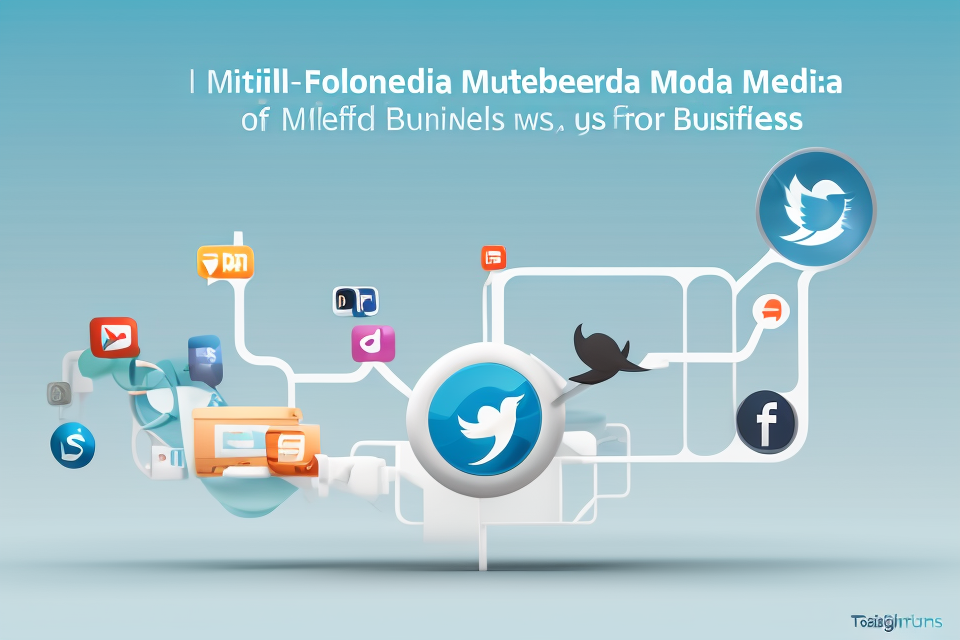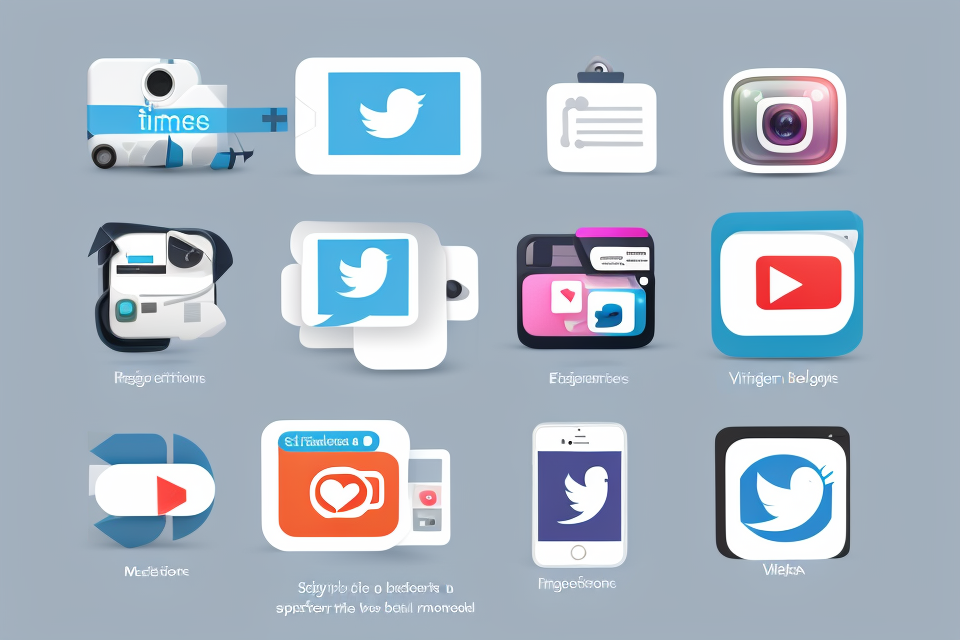The media has become an integral part of our lives, shaping our opinions, beliefs, and attitudes. While it has revolutionized the way we communicate and access information, it also raises questions about its impact on society. Can media be both good and bad? Is it a double-edged sword that can benefit us as well as harm us? In this article, we will explore the pros and cons of media in today’s society and try to answer these questions. Join us as we delve into the complex world of media and its influence on our lives.
The Influence of Media on Society
The Positive Impact of Media
Media has had a profound impact on society, and it is important to acknowledge its positive contributions. Here are some of the ways in which media has had a positive impact on society:
Enables access to information
One of the most significant benefits of media is that it provides access to information on a wide range of topics. Through media, people can learn about current events, scientific discoveries, and cultural developments from around the world. This access to information can be especially valuable for people who live in areas where access to education and resources is limited.
Fosters creativity and self-expression
Media also provides a platform for creative expression and self-promotion. Social media platforms, for example, have given individuals the opportunity to share their ideas, stories, and art with a global audience. This has led to an explosion of creativity, with people using media to showcase their talents and connect with others who share their interests.
Facilitates communication and connection
Finally, media has made it easier for people to communicate and connect with one another. Social media platforms, messaging apps, and video conferencing tools have all made it easier for people to stay in touch with friends and family, no matter how far away they are. This has helped to break down barriers and promote understanding between people from different cultures and backgrounds.
The Negative Impact of Media
The Spread of Misinformation and Fake News
The rapid dissemination of information through social media and other digital platforms has made it easier than ever for misinformation and fake news to spread quickly. This can have serious consequences, particularly during times of crisis or when public opinion is being shaped around a particular issue. Misinformation can lead to confusion, mistrust, and even harm if people act on false information.
Contributes to Social Isolation and Loneliness
Another negative impact of media is its potential to contribute to social isolation and loneliness. With the rise of social media and other digital platforms, people are spending more time interacting with screens rather than face-to-face with others. This can lead to feelings of disconnection and isolation, particularly for those who may already be socially isolated. Additionally, the curated nature of social media can create a false sense of connection and can lead to feelings of envy and inadequacy.
Perpetuates Harmful Stereotypes and Biases
Media also has the power to perpetuate harmful stereotypes and biases. Through the portrayal of certain groups in media, people can form opinions and beliefs that are based on inaccurate or incomplete information. This can have serious consequences, particularly for marginalized groups who may already face discrimination and prejudice. Media can also reinforce negative stereotypes and perpetuate harmful beliefs about certain groups, leading to further marginalization and discrimination.
The Role of Media in Shaping Public Opinion
The Power of Media in Influencing Public Opinion
- Media plays a crucial role in shaping public opinion by setting the agenda for public discourse. This means that media outlets can decide which issues are important and worthy of discussion, and which issues are not. For example, during an election year, the media may focus heavily on the candidates and their policies, which can influence how the public views them.
- Media can also mobilize public opinion on issues. By providing a platform for discussion and debate, media outlets can bring attention to important issues and encourage people to take action. For example, media coverage of environmental issues can raise awareness about the need for conservation and inspire people to take steps to protect the environment.
- Media can hold those in power accountable. By providing a platform for criticism and analysis, media outlets can shine a light on the actions of those in power and hold them accountable for their actions. This can be especially important in democratic societies, where media can serve as a watchdog and ensure that those in power are acting in the best interests of the people. However, it is important to note that media outlets can also be biased and may have their own agendas, which can influence how they cover certain issues or individuals.
The Dangers of Media Manipulation
- Media manipulation is a growing concern in today’s society as it can have significant impacts on public opinion and decision-making.
- One of the dangers of media manipulation is the perpetuation of biased narratives, which can lead to skewed perceptions of reality and misinformed opinions.
- Media outlets may present a one-sided view of events or issues, omitting important context or alternative perspectives, leading to a distorted understanding of the situation.
- This can be particularly harmful in sensitive or controversial topics, such as politics or social issues, where objective reporting is crucial for informed decision-making.
- Another danger of media manipulation is the spread of misinformation, which can have serious consequences for individuals and society as a whole.
- In the age of social media, false information can spread rapidly and widely, leading to panic, confusion, and harmful actions.
- Misinformation can undermine public trust in the media and institutions, leading to a breakdown in social cohesion and a lack of confidence in the democratic process.
- Finally, media manipulation can create echo chambers and polarization, where individuals only consume media that confirms their existing beliefs and ignore opposing views.
- This can lead to the entrenchment of extreme or misguided beliefs, as well as increased tribalism and intolerance towards those with different opinions.
- In order to combat the dangers of media manipulation, it is important for media consumers to be critical and discerning, seeking out multiple sources and viewpoints to form a well-informed opinion.
The Impact of Social Media on Individuals and Society
The Positive Impact of Social Media
Enables connection and communication
In today’s fast-paced world, social media has revolutionized the way people connect and communicate with each other. It has broken down geographical barriers, enabling individuals to connect with others from different parts of the world. Through social media platforms, people can share their thoughts, ideas, and opinions with others, fostering a sense of community and belonging. Social media has also made it easier for people to keep in touch with friends and family, even when they are physically far apart.
Provides a platform for self-expression and creativity
Social media has provided a platform for individuals to express themselves and showcase their creativity. It has given rise to a new form of storytelling, where individuals can share their personal experiences and stories with a global audience. Social media has also enabled artists, musicians, and writers to reach a wider audience, giving them the opportunity to showcase their work and connect with fans from around the world.
Facilitates access to information and resources
Social media has become a powerful tool for disseminating information and resources. It has enabled individuals to access a wealth of information on a wide range of topics, from news and current events to health and wellness. Social media has also made it easier for people to access resources such as educational materials, job opportunities, and community services. Through social media, individuals can connect with organizations and groups that share their interests and values, providing them with access to a supportive community of like-minded individuals.
The Negative Impact of Social Media
While social media has undoubtedly transformed the way we communicate and connect with others, it has also been associated with several negative impacts on individuals and society. Here are some of the most notable ones:
- Can contribute to social isolation and loneliness: Although social media provides a platform for people to connect with others, it has also been linked to feelings of social isolation and loneliness. This is because the constant comparison to others’ lives and appearances on social media can lead to feelings of inadequacy and insecurity, causing people to withdraw from real-life social interactions.
- Can perpetuate harmful stereotypes and biases: Social media has been criticized for perpetuating harmful stereotypes and biases, particularly regarding race, gender, and sexual orientation. This is because social media algorithms tend to amplify content that reinforces existing beliefs, which can lead to the spread of misinformation and hate speech.
- Can lead to addiction and mental health issues: The constant notifications, likes, and comments on social media can be addictive, leading to compulsive behaviors that interfere with daily life. Additionally, the pressure to maintain an online persona and the fear of missing out can contribute to anxiety, depression, and other mental health issues.
The Responsibility of Media in a Democracy
The Importance of Media in a Functioning Democracy
The media serves as a vital component in a functioning democracy, as it acts as a watchdog for government accountability, provides a platform for diverse perspectives, and facilitates the exchange of ideas and public discourse.
As a Watchdog for Government Accountability
In a democratic society, the media plays a crucial role in keeping the government accountable to the people. It investigates and reports on the actions of the government, holding public officials responsible for their decisions and ensuring that they are acting in the best interest of the people. This helps to prevent corruption and abuse of power, and promotes transparency and accountability in government.
Providing a Platform for Diverse Perspectives
Media outlets also serve as a platform for diverse perspectives, allowing individuals and groups to express their opinions and ideas. This promotes inclusivity and diversity, and helps to ensure that all voices are heard in public discourse. By providing a space for a wide range of perspectives, the media helps to foster a more informed and engaged citizenry, and helps to prevent the concentration of power in the hands of a few.
Facilitating the Exchange of Ideas and Public Discourse
Additionally, the media plays a critical role in facilitating the exchange of ideas and public discourse. It provides a space for individuals and groups to engage in meaningful discussions and debates, and helps to bring attention to important issues and events. This helps to foster a more informed and engaged citizenry, and helps to ensure that public discourse is vibrant and dynamic.
Overall, the media is a critical component in a functioning democracy, serving as a watchdog for government accountability, providing a platform for diverse perspectives, and facilitating the exchange of ideas and public discourse.
The Dangers of Media in a Democratic Society
In a democratic society, the media plays a crucial role in shaping public opinion and holding those in power accountable. However, the media can also be a double-edged sword, with the potential to perpetuate biased narratives, spread misinformation, and create echo chambers and polarization.
- Perpetuating biased narratives: The media has the power to shape public opinion, and when this power is wielded irresponsibly, it can result in the perpetuation of biased narratives. For example, when media outlets prioritize sensationalism over accuracy, they can inadvertently perpetuate harmful stereotypes and misinformation. This can have serious consequences, particularly in times of political turmoil, where misinformation can lead to violence and unrest.
- Spreading misinformation: The proliferation of social media has made it easier than ever for misinformation to spread rapidly. In some cases, this can be harmless, such as when a piece of news is corrected shortly after it is published. However, in other cases, misinformation can have serious consequences, particularly when it relates to public health or safety. For example, during the COVID-19 pandemic, misinformation about the efficacy of masks or the origins of the virus could have led to unnecessary illness and death.
- Creating echo chambers and polarization: In a democratic society, it is important for citizens to be exposed to a variety of viewpoints. However, the media can inadvertently create echo chambers, where individuals are only exposed to information that confirms their existing beliefs. This can lead to polarization, where individuals become more entrenched in their beliefs and less willing to consider alternative viewpoints. This can have serious consequences for democracy, as it can lead to the breakdown of civil discourse and the rise of extremist groups.
The Future of Media in Society
The Potential for Media to Promote Positive Change
Can facilitate the exchange of ideas and public discourse
Media serves as a platform for individuals to express their thoughts and opinions, and it has the potential to bring people together to engage in meaningful discussions. Social media platforms, in particular, have enabled people from all over the world to connect and share their perspectives on various issues. This exchange of ideas can lead to a better understanding of different cultures and beliefs, fostering empathy and promoting tolerance.
Can hold those in power accountable
The media has the power to expose corruption, unethical behavior, and abuse of power by those in positions of authority. By shining a light on these issues, the media can promote transparency and accountability, which are essential for maintaining a fair and just society. This watchdog role of the media can prevent those in power from abusing their positions and can also encourage responsible behavior.
Can promote social justice and equality
Media has the potential to raise awareness about social issues and injustices, such as discrimination, poverty, and inequality. By highlighting these issues, the media can bring attention to the struggles faced by marginalized communities and can advocate for change. Through powerful storytelling and investigative journalism, the media can inspire individuals to take action and work towards a more equitable society.
However, it is important to note that media can also have negative consequences, and it is up to the media consumers to critically evaluate the information they receive and make informed decisions.
The Challenges Facing Media in the Future
- The spread of misinformation and fake news
- The proliferation of social media platforms has led to an increase in the dissemination of false information and fake news. This has created a challenge for media outlets to distinguish between fact and fiction, which can undermine the credibility of the media and erode public trust.
- The increasing polarization of society
- Media outlets have a responsibility to represent diverse perspectives and provide balanced coverage. However, as society becomes more polarized, media outlets may face pressure to cater to specific audiences, which can result in a narrowing of perspectives and a lack of exposure to alternative viewpoints.
- The challenge of maintaining journalistic integrity in a digital age
- The rise of digital media has transformed the way news is consumed and produced. While this has provided new opportunities for media outlets to reach wider audiences, it has also created challenges for maintaining journalistic integrity. With the pressure to produce content quickly and compete for clicks, some media outlets may sacrifice accuracy and depth in favor of sensationalism or clickbait headlines.
FAQs
1. What is the media?
The media refers to various forms of communication, such as television, radio, newspapers, and the internet, through which information is disseminated to the public.
2. What is the role of the media in society?
The media plays a crucial role in society by informing, educating, and entertaining the public. It also acts as a watchdog, holding those in power accountable and providing a platform for diverse voices to be heard.
3. Can media be good?
Yes, the media can be a force for good in society. It can provide important information, raise awareness about social issues, and promote positive values and behaviors. The media can also be a powerful tool for entertainment and enjoyment.
4. Can media be bad?
Yes, the media can also be a force for bad in society. It can spread misinformation, perpetuate harmful stereotypes, and promote negative behaviors. The media can also be used to manipulate public opinion and promote propaganda.
5. How can we determine whether the media is good or bad?
It can be challenging to determine whether the media is good or bad, as it depends on the specific content and context. One way to evaluate the media is to consider its accuracy, reliability, and ethical standards. It is also important to be critical of the media and consider multiple sources before forming an opinion.
6. What are some examples of the media being good?
There are many examples of the media being good, such as news stories that expose corruption and injustice, documentaries that raise awareness about important issues, and entertainment that promotes positive values and messages.
7. What are some examples of the media being bad?
There are also many examples of the media being bad, such as sensationalized news coverage that perpetuates negative stereotypes, reality TV shows that promote unhealthy behaviors, and social media platforms that spread misinformation and hate speech.
8. How can we make sure the media is used for good?
We can make sure the media is used for good by being critical consumers and seeking out reliable and ethical sources of information. We can also support media outlets that prioritize accuracy, diversity, and ethical standards. Additionally, we can use the media to promote positive values and behaviors, and to hold those in power accountable.



